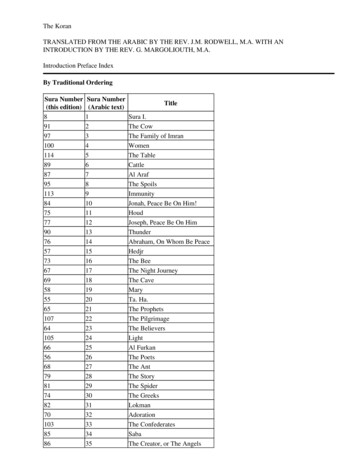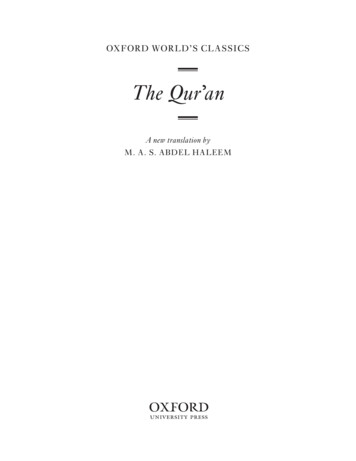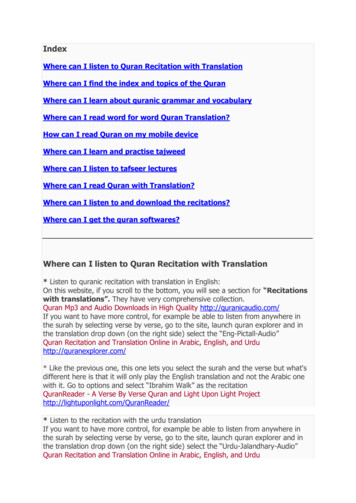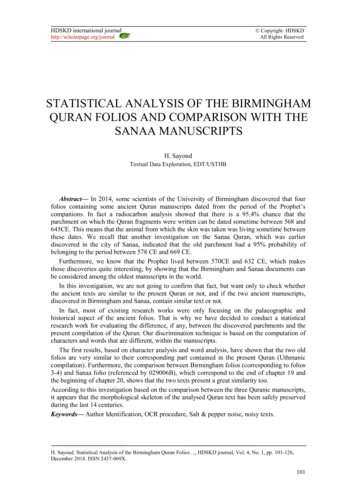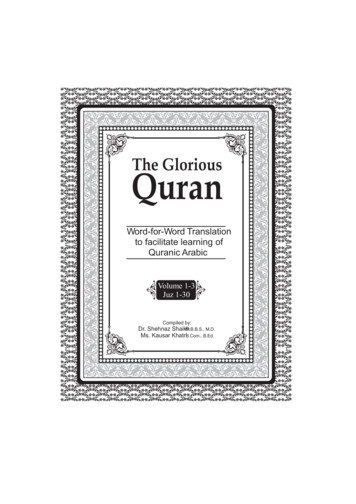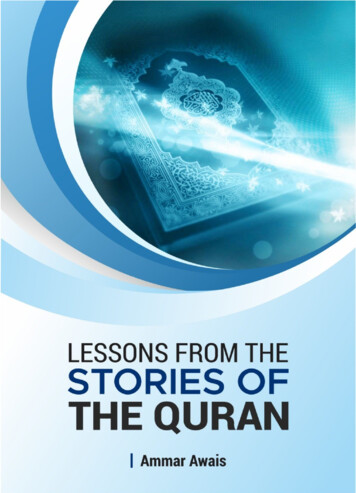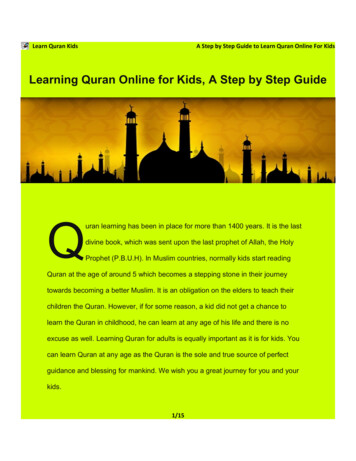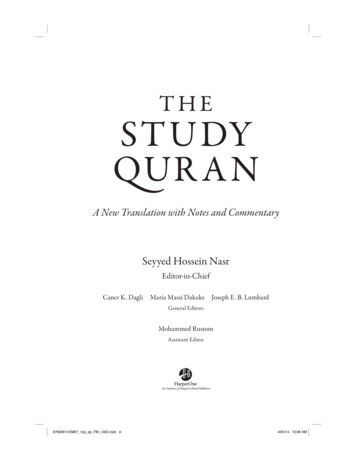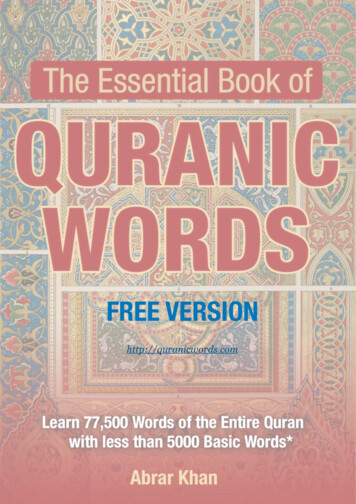
Transcription
Quran Surah (Sura) Maida (Ma'ida) Tafsir Ibn Kathir, Arabic English, HTMl, PDF, with Recitation By Said Al Ghamdi MP3, Free DownloadTafsir Ibn Kathir Alama Imad ud Din Ibn KathirTafsir ibn Kathir, is a classic Sunni Islam Tafsir (commentary of the Qur'an) by Imad ud Din Ibn Kathir. It is considered to be asummary of the earlier Tafsir al-Tabari. It is popular because it uses Hadith to explain each verse and chapter of the Qur'an 'Imad AdDin, Isma'il bin 'Umar bin Kathir, was born in 1301 in Busra, Syria and was taught by Ibn Taymiyya, Al-Mizzi, Ibn Al Firkah, ‘Isa bin AlMutim, Ahmed bin Abi-Talib, Ibn Al-Hajjar, Baha Ad-Din Al-Qasim bin Muzaffar bin ‘Asakir, Ibn Ash-Shirazi, Ishaq bin Yahya AlAmmuddi, Zahriyyah Shaykh, and Muhammad bin Zarrad.Surah Al Ma'idaHomeAudioIndexPreviousNextPage NavigationSurah Al-Ma'idah01-02 03-03 04-0405-05 06-06 07-1112-14 15-16 17-1819-19 20-26 27-3132-34 35-37 38-40Recitation: Sa'ad Al Ghamdi41-44 45-45 46-4748-50 51-53 54-5657-58 59-63 64-6667-67 68-69 70-7172-75 76-77 78-81The Virtues of Surah Al-Ma'idah; When It was Revealed82-86 87-88 89-89At-Tirmidhi recorded that Abdullah bin Amr said,90-93 94-95 96-99100-102 103-104"The last Surahs to be revealed were Surah Al-Ma'idah and Surah Al-Fath.'' (Surah 48)105-105 106-108At-Tirmidhi commented, "This Hadith is Hasan Gharib.''109-109 110-111and it was also reported that Ibn Abbas said that the last Surah to be revealed was, (When there comes the help of Allah and the Conquest). (Surah 110)112-115 116-118119-120Al-Hakim collected a narration similar to that of At-Tirmidhi in his Mustadrak, and he said, "It is Sahihaccording to the criteria of the Two Sheikhs and they did not record it.''Tafsir Of 119120Revelation of Mystery(Kashf Al Mahjub)Ali HujwiriTranslated byLt Col (R) Muhammad Ashraf JavedAl-Hakim narrated that Jubayr bin Nufayr said,"I performed Hajj once and visited Aishah and she said to me, O Jubayr! Do you read (or memorize) AlMa'idah?'I answered Yes.'She said, It was the last Surah to be revealed. Therefore, whatever permissible matters you find in it,then consider (treat) them permissible. And whatever impermissible matters you find in it, then consider(treat) them impermissible.'''Al-Hakim said, "It is Sahih according to the criteria of the Two Sheikhs and they did not record it.''Imam Ahmad recorded that Abdur-Rahman bin Mahdi related that Muawiyah bin Salih added this statement inthe last Hadith,I (Jubayr) also asked Aishah about the Messenger of Allah's conduct and she answered by saying, "TheQur'an.''An-Nasa'i also recorded it.Al Mai'da In the Name of Allah, the Most Gracious, the Most Merciful. 5:1 O you who believe! Fulfill (your) obligations. Lawful to you (for food) are all the beasts of cattle except that which will be announced toyou (herein), game (also) being unlawful when you assume Ihram.Quick LinksOnline Quran Recitation Verily, Allah commands that which He wills.- Ghamdi - Sudais- Shuraim- Ajmi- Ali JaberRecitation With Translation5:2 O you who believe! Violate not the sanctity of the symbols of Allah, nor of the SacredMonth, nor of the Hady brought for sacrifice, nor the garlands, nor the people coming tothe Sacred House (Makkah), seeking the bounty and good pleasure of their Lord.- Urdu Basit - Urdu Sudais - Pashto- Banglay (Bangali)- Hindi ( )But when you finish the Ihram, then hunt, and let not the hatred of some people in (once)stopping you from Al-Masjid Al-Haram (at Makkah) lead you to transgression.- English Saheeh- English Muhsin- François- Español - Türk Help you one another in Al-Birr and At-Taqwa, but do not help one another in sin andtransgression.Quran Tafsir Video- Bayan al Quran Dr Asrar- Sout al Quran Shuja uddin- Bayan al Quran Dr Asrar (Eng) And have Taqwa of Allah. Verily, Allah is severe in punishment.Top- Sirat e Mustaqeem Dr G MurtazaOnline VideosNext 3Allah says;- Quran Recitation .- Asma ul Husna- Hamd NaatOnline Talk showsO you who believe! Fulfill (your) obligations.Ibn Abi Hatim recorded that;- Dr Zakir Naika man came to Abdullah bin Mas ud and said to him, "Advise me.''- Dr Israr AhmadHe said, "When you hear Allah's statement, (O you who believe!) then payfull attention, for it is a righteous matter that He is ordaining or an evil thing that He is forbidding.''- Sheikh Ahmad Deedat- Maulana Tariq Jamil- Maulana Tariq Jamil 1- Religion & Human IntelligenceOnline Islamic Movies- Message Islamic Movie(English, Arabic, Urdu, French)- Yusuf (Joseph)- Moses- Ashab e Kahf- Awais Al Qarni- Imam Abu Hanifah- Ibn Taymiyyah - Nur ud Din Zangi- Salahuddin Ayubi- Omar MukhtarKhaythamah said,"Everything in the Qur'an that reads, (O you who believe), reads in theTawrah, O you who are in need.'''Allah said, (Fulfill (your) obligations).Ibn Abbas, Mujahid and others said that; obligations' here means treaties.Ibn Jarir mentioned that there is a consensus for this view.Ibn Jarir also said that;it means treaties, such as the alliances that they used to conduct.Ali bin Abi Talhah reported that Ibn Abbas commented: (O youwho believe! Fulfill (your) obligations),"Refers to the covenants, meaning, what Allah permitted, prohibited, ordained and set limits for inthe Qur'an. Therefore, do not commit treachery or break the covenants. Allah emphasized thiscommand when He said,- Tipu Sultan - Nishan HaiderAnd those who break the covenant of Allah, after its ratification, and sever that which Allah hascommanded to be joined, and work mischief in the land, on them is the curse, and for them is theunhappy (evil) home (i.e. Hell). (13:25)"Ad-Dahhak said that, (Fulfill your obligations),"Refers to what Allah has permitted and what He has prohibited. Allah has taken the covenant fromthose who proclaim their faith in the Prophet and the Book to fulfill the obligations that He hasordered for them in the permissible and the impermissible.''Explaining the Lawful and the Unlawful BeastsAllah said,. .Lawful to you (for food) are all the beasts of cattle,camels, cows and sheep, as Al-Hasan, Qatadah and several others stated.Ibn Jarir said that this Tafsir conforms to the meaning of ( beasts of cattle') that the Arabs had.We should mention that Ibn Umar, Ibn Abbas and others relied on this Ayah as evidence to allow eatingthe meat of the fetus if it is found dead in the belly of its slaughtered mother.There is a Hadith to the same effect collected in the Sunan of Abu Dawud, At-Tirmidhi and Ibn Majahand narrated by Abu Sa id who said,"We asked, O Messenger of Allah! When we slaughter a camel, cow or sheep, we sometimes find afetus in its belly, should we discard it or eat its meat?'He said, Eat it if you want, because its slaughter was fulfilled when its mother was slaughtered.''At-Tirmidhi said, "This Hadith is Hasan.''Abu Dawud recorded that Jabir bin Abdullah said that the Messenger of Allah said, Proper slaughter of the fetus is fulfilled with the slaughter of its mother.Only Abu Dawud collected this narration.Allah's statement,. .except that which will be announced to you (herein),Ali bin Abi Talhah reported that Ibn Abbas said that it refers to,"The flesh of dead animals, blood and the meat of swine.''Qatadah said,"The meat of dead animals and animals slaughtered without Allah's Name being pronounced at thetime of slaughtering.''It appears, and Allah knows best, that the Ayah refers to Allah's other statement, Forbidden to you (for food) are: Al-Maytah (the dead animals), blood, the flesh of swine, and what has been slaughtered as a sacrifice for others than Allah, andthat which has been killed by strangling, or by a violent blow, or by a headlong fall, or by thegoring of horns - and that which has been (partly) eaten by a wild animal. (5:3), for although the animals mentioned in this Ayah are types of permissible cattle (except for swine),they become impermissible under the circumstances that the Ayah (5:3) specifies.This is why Allah said afterwards, (Unless you are able toslaughter it (before its death), (5:3) and that which is sacrificed (slaughtered) on An-Nusub (stonealtars)) as the latter type is not permissible, because it can no longer be slaughtered properly.Hence, Allah's statement, (Lawful to you are allthe beasts of cattle except that which will be announced to you), means,except the specific circumstances that prohibit some of these which will be announced to you.Allah said,. .game (also) being unlawful when you assume Ihram.Some scholars said that;the general meaning of cattle' includes domesticated cattle, such as camels, cows and sheep, andwild cattle, such as gazelle, wild cattle and wild donkeys.Allah made the exceptions mentioned above (dead animals blood, flesh of swine etc.), andprohibited hunting wild beasts while in the state of Ihram.It was also reported that the meaning here is,"We have allowed for you all types of cattle in all circumstances, except what We excluded herewithfor the one hunting game while in the state of Ihram.''Allah said, But if one is forced by necessity, without willful disobedience, and not transgressing, then, Allah isOft-Forgiving, Most Merciful. (16:115)This Ayah means, "We allowed eating the meat of dead animals, when one is forced by necessity,under the condition that one is not transgressing the limits or overstepping them.''Here, Allah states, "Just as We allowed the meat of cattle in all conditions and circumstances, thendo not hunt game when in the state of Ihram, for this is the decision of Allah, Who is the MostWise in all that He commands and forbids.''So Allah said;. Verily, Allah commands that which He wills.The Necessity of Observing the Sanctity of the Sacred Area and the Sacred MonthsAllah continues, .O you who believe! Violate not the sanctity of Sha'a'ir Allah (the symbols of Allah),Ibn Abbas said,"Sha a'ir Allah means the rituals of Hajj.''Mujahid said,"As-Safa and Al-Marwah, and the sacrificial animal are the symbols of Allah.''It was also stated that;Sha a'ir Allah is what He prohibited. Therefore, it means, do not violate what Allah prohibited.Allah said afterwards,. .nor of the Sacred Month,for you are required to respect and honor the Sacred Month and to refrain from what Allah forbadeduring it, such as fighting. This also lays emphasis on avoiding sins during that time.As Allah said; They ask you concerning fighting in the Sacred Month. Say, "Fighting therein is a great(transgression).'' (2:217)and, (Verily, the number of months with Allah is twelve months (in a year). (9:36)Al-Bukhari recorded in his Sahih that Abu Bakrah said that the Messenger of Allah said during theFarewell Hajj, : The division of time has returned as it was when Allah created the Heavens and the earth. The yearis twelve months, four of which are sacred: Three are in succession, (they are:) Dhul-Qa'dah,Dhul-Hijjah and Muharram, and (the fourth is) Rajab of (the tribe of) Mudar which comesbetween Jumada (Ath-Thaniyah) and Sha'ban.)This Hadith testifies to the continued sanctity of these months until the end of time.Taking the Hady to the Sacred House of Allah, Al-Ka bahAllah's statement,. .nor of the Hady brought for sacrifice, nor the garlands,means, do not abandon the practice of bringing the Hady (sacrificial animals) to the Sacred House,as this ritual is a form of honoring the symbols of Allah.Do not abandon the practice of garlanding these animals on their necks, so that they aredistinguished from other cattle. This way, it will be known that these animals are intended to beoffered as Hady at the Ka bah, and thus those who might intend some harm to them wouldrefrain from doing so. Those who see the Hady might be encouraged to imitate this ritual, andindeed, he who calls to a type of guidance, will earn rewards equal to the rewards of those whofollow his lead, without decrease in their own rewards.When the Messenger of Allah intended to perform Hajj, he spent the night at Dhul-Hulayfah, whichis also called Wadi Al-Aqiq. In the morning, the Prophet made rounds with his wives, who were nineat that time, performed Ghusl (bath), applied some perfume and performed a two Rak ah prayer.He then garlanded the Hady and announced aloud his intention to perform Hajj and Umrah. TheProphet's Hady at the time consisted of plenty of camels, more than sixty, and they were amongthe best animals, the healthiest and most physically acceptable, just as Allah's statementproclaims, Thus it is, and whosoever honors the symbols of Allah, then it is truly, from the piety of thehearts. (22:32)Muqatil bin Hayyan said that Allah's statement, (nor the garlands) means,"Do not breach their sanctity.''During the time of Jahiliyyah, the people used to garland themselves with animal hair and peltswhen they left their areas in months other than the Sacred Months. The idolators of the SacredHouse Area used to garland themselves with the tree-stems of the Sacred Area, so that they weregranted safe passage.''This statement was collected by Ibn Abi Hatim, who also recorded that Ibn Abbas said,"There are two Ayat in this Surah (Al-Ma'idah) that were abrogated, the Ayah about thegarlands (5:2), and (So if they come to you (OMuhammad), either judge between them, or turn away from them).'' (5:42)The Necessity of Preserving the Sanctity and Safety of those who Intend to Travel to the Sacred HouseAllah said,. .nor the people coming to the Sacred House (Makkah), seeking the bounty and good pleasure of theirLord.The Ayah commands: Do not fight people who are heading towards the Sacred House of Allah,which if anyone enters it, he must be granted safe refuge. Likewise, those who are heading towardsthe Sacred House seeking the bounty and good pleasure of Allah, must not be stopped, prevented,or frightened away from entering the Sacred House.Mujahid, Ata, Abu Al-Aliyah, Mutarrif bin Abdullah, Abdullah bin Ubayd bin Umayr, Ar-Rabi bin Anas,Muqatil bin Hayyan, Qatadah and several others said that, (seeking thebounty of their Lord),refers to trading.A similar discussion preceded concerning the Ayah; There is no sin on you if you seek the bounty of your Lord (during pilgrimage by trading). (2:198)Allah said; (and pleasure).Ibn Abbas said that the word pleasure' in the Ayah refers to, "seeking Allah's pleasure by theirHajj.''Ikrimah, As-Suddi and Ibn Jarir mentioned that;this Ayah was revealed concerning Al-Hutam bin Hind Al-Bakri, who had raided the cattle belongingto the people of Al-Madinah. The following year, he wanted to perform Umrah to the House of Allahand some of the Companions wanted to attack him on his way to the House. Allah revealed, (nor the people coming to the SacredHouse (Makkah), seeking the bounty and good pleasure of their Lord).Hunting Game is Permissible After Ihram EndsAllah said,. .But when you finish the Ihram, then hunt,When you end your Ihram, it is permitted for you to hunt game, which was prohibited for youduring Ihram.Although this Ayah contains a command that takes effect after the end of a state of prohibition (duringIhram in this case), the Ayah, in fact, brings back the ruling that was previously in effect. If the previousruling was an obligation, the new command will uphold that obligation, and such is the case withrecommended and permissible matters. There are many Ayat that deny that the ruling in such cases isalways an obligation. Such is also the case against those who say that it is always merely allowed. Whatwe mentioned here is the correct opinion that employs the available evidence, and Allah knows best.Justice is Always NecessaryAllah said,. .and let not the hatred of some people in (once) stopping you from Al-Masjid Al-Haram (at Makkah)lead you to transgression (and hostility on your part).The meaning of this Ayah is apparent, as it commands: Let not the hatred for some people, whoprevented you from reaching the Sacred House in the year of Hudaybiyyah, make you transgressAllah's Law and commit injustice against them in retaliation. Rather, rule as Allah has commandedyou, being just with every one. We will explain a similar Ayah later on, And let not the enmity and hatred of others make you avoid justice. Be just: that is nearer topiety, (5:8)which commands: do not be driven by your hatred for some people into abandoning justice, forjustice is ordained for everyone, in all situations.Ibn Abi Hatim recorded that Zayd bin Aslam said,"The Messenger of Allah and his Companions were in the area of Al-Hudaybiyyah when the idolatorsprevented them from visiting the House, and that was especially hard on them. Later on, someidolators passed by them from the east intending to perform Umrah. So the Companions of theProphet said, Let us prevent those (from Umrah) just as their fellow idolators prevented us.'Thereafter, Allah sent down this Ayah.''Ibn Abbas and others said that;"Shana'an'' refers to enmity and hate.Allah said next,. .Help you one another in Al-Birr and At-Taqwa; but do not help one another in sin and transgression.Allah commands His believing servants to help one another perform righteous, good deeds, which isthe meaning of Al-Birr', and to avoid sins, which is the meaning of At-Taqwa'.Allah forbids His servants from helping one another in sin, Ithm' and committing the prohibitions.Ibn Jarir said that,"Ithm means abandoning what Allah has ordained, while transgression means overstepping thelimits that Allah set in your religion, along with overstepping what Allah has ordered concerningyourselves and others.''Imam Ahmad recorded that Anas bin Malik said that the Messenger of Allah said, Support your brother whether he was unjust or the victim of injustice.He was asked, "O Messenger of Allah! We know about helping him when he suffers injustice, sowhat about helping him when he commits injustice?''He said, Prevent and stop him from committing injustice, and this represents giving support to him.Al-Bukhari recorded this Hadith through Hushaym.Ahmad recorded that one of the Companions of the Prophet narrated the Hadith, The believer who mingles with people and is patient with their annoyance, earns more reward thanthe believer who does not mingle with people and does not observe patience with their annoyance.Muslim recorded a Hadith that states, He who calls to a guidance, will earn a reward similar to the rewards of those who accept his call,until the Day of Resurrection, without decreasing their rewards.Whoever calls to a heresy, will carry a burden similar to the burdens of those who accept his call,until the Day of Resurrection, without decreasing their own burdens. And have Taqwa of Allah. Verily, Allah is severe in punishment.Previous 1-2 5:3 Forbidden to you (for food) are: Al-Maytah (the dead animals), blood, the flesh of swine, and that which has been slaughtered as a sacrifice for other than Allah,and that which has been killed by strangling, or by a violent blow, or by a headlongfall, or by the goring of horns and that which has been (partly) eaten by a wildanimal unless you are able to slaughter it (before its death) and that which issacrificed (slaughtered) on An-Nusub (stone altars). (Forbidden) also is to make decisions with Al-Azlam (arrows) (all) that is Fisq(disobedience and sin). This day, those who disbelieved have given up all hope of your religion; so fear them not,but fear Me. This day, I have perfected your religion for you, completed My favor upon you, and havechosen for you Islam as your religion. But as for him who is forced by severe hunger, with no inclination to sin (such can eatthese above mentioned animals), then surely, Allah is Oft-Forgiving, Most Merciful.TopNext 4The Animals that are Unlawful to EatAllah says; .Forbidden to you (for food) are: Al-Maytah (the dead animals), blood,Allah informs His servants that He forbids consuming the mentioned types of foods, such as the Maytah,which is the animal that dies before being properly slaughtered or hunted. Allah forbids this type of fooddue to the harm it causes, because of the blood that becomes clogged in the veins of the dead animal.Therefore, the Maytah is harmful, religiously and physically, and this is why Allah has prohibited it.The only exception to this ruling is fish, for fish is allowed, even when dead, by slaughtering orotherwise.Malik in his Muwatta, also Abu Dawud, At-Tirmidhi, An-Nasa'i and Ibn Majah in their Sunan, IbnKhuzaymah and Ibn Hibban in their Sahihs, all recorded that Abu Hurayrah said that the Messenger ofAllah was asked about seawater.He said, Its water is pure and its dead are permissible.The same ruling applies to locusts, as proven in a Hadith that we will mention later.Allah's statement,. .blood.,This refers to flowing blood, according to Ibn Abbas and Sa id bin Jubayr, and it is similar to Allah'sother statement, (Blood poured forth.). (6:145)Ibn Abi Hatim recorded that Ibn Abbas was asked about the spleen and he said,"Eat it.''They said, "It is blood.''He said, "You are only prohibited blood that was poured forth.''Abu Abdullah, Muhammad bin Idris Ash-Shafii recorded that Ibn Umar said that the Messenger of Allahsaid, We were allowed two dead animals and two (kinds of) blood. As for the two dead animals, they are fish and locust. As for the two bloods, they are liver and spleen.Imam Ahmad bin Hanbal, Ibn Majah, Ad-Daraqutni and Al-Bayhaqi also recorded this Hadiththrough Abdur-Rahman bin Zayd bin Aslam, who is a weak narrator.Allah's statement,. .the flesh of swine.includes domesticated and wild swine, and also refers to the whole animal, including its fat, for thisis what the Arabs mean by Lahm or flesh'.Muslim recorded that Buraydah bin Al-Husayb Al-Aslami said that the Messenger of Allah said, He who plays Nardshir (a game with dice that involves gambling) is just like the one who puts hishand in the flesh and blood of swine.If this is the case with merely touching the flesh and blood of swine, so what about eating andfeeding on it! This Hadith is a proof that Lahm means the entire body of the animal, including itsfat.It is recorded in the Two Sahihs that the Messenger of Allah said, Allah made the trade of alcohol, dead animals, pigs and idols illegal.The people asked, "O Allah's Messenger! What about the fat of dead animals, for it was used forgreasing the boats and the hides; and people use it for lanterns?''He said, No, it is illegal.In the Sahih of Al-Bukhari, Abu Sufyan narrated that he said to Heraclius, Emperor of Rome,"He (Muhammad) prohibited us from eating dead animals and blood.''Allah said,. .And that which has been slaughtered as a sacrifice for other than Allah.Therefore, the animals on which a name other than Allah was mentioned upon slaughtering it, isimpermissible, because Allah made it necessary to mention His Glorious Name upon slaughteringthe animals, which He created. Whoever does not do so, mentioning other than Allah's Name, suchas the name of an idol, a false deity or a monument, when slaughtering, he makes this meatunlawful, according to the consensus.Allah's statement,. .and that which has been killed by strangling.,either intentionally or by mistake, such as when an animal moves while restrained and dies bystrangulation because of its struggling, this animal is also unlawful to eat. .or by a violent blow.,This refers to the animal that is hit with a heavy object until it dies.Ibn Abbas and several others said;it is the animal that is hit with a staff until it dies.Qatadah said,"The people of Jahiliyyah used to strike the animal with sticks and when it died, they would eatit.''It is recorded in the Sahih that Adi bin Hatim said,"I asked, O Allah's Messenger! I use the Mi rad for hunting and catch game with it.' He replied, If the game is hit by its sharp edge, eat it. But, if it is hit by its broad side, do not eat it, for it hasbeen beaten to death.Therefore, the Prophet made a distinction between killing the animal with the sharp edge of an arrow ora hunting stick, and rendered it lawful, and what is killed by the broad side of an object, and rendered itunlawful because it was beaten to death.There is a consensus among the scholars of Fiqh on this subject. .or by a headlong fall,the animal that falls headlong from a high place and dies as a result, it is also prohibited.Ali bin Abi Talhah reported that Ibn Abbas said that;an animal that dies by a headlong fall, "Is that which falls from a mountain.''Qatadah said that;it is the animal that falls in a well.As-Suddi said that;it is the animal that falls from a mountain or in a well. .or by the goring of horns,the animal that dies by being gorged by another animal, it is also prohibited, even if the horn opensa flesh wound and it bleeds to death from its neck.Allah's statement,. .and that which has been (partly) eaten by a wild animal,refers to the animal that was attacked by a lion, leopard, tiger, wolf or dog, then the wild beasteats a part o
Quran Surah (Sura) Maida (Ma'ida) Tafsir Ibn Kathir, Arabic English, HTMl, PDF, with Recitation By Said Al Ghamdi MP3, Free Download Tafsir Ibn Kathir Alama Imad ud Din Ibn Kathir Tafsir ibn Kathir, is a classic Sunni Islam Tafsir (commentary of the Qur'an) by Imad ud Din Ibn Kathir. It is considered to be a


